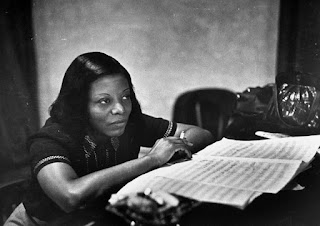'Zodiac': Reaffirming the special gifts Mary Lou Williams brought to jazz piano and composition
Worth a reconception as well as revival in its own right, Mary Lou Williams'' "Zodiac Suite" is a landmark long-form composition in jazz history. Chris Pattishall, a fellow pianist of this pioneer among nonsinging female jazz stars, has assembled a small group enhanced by tasteful sound design and programming from Rafiq Bhatia.
 |
| Mary Lou Williams focuses her attention. |
No matter what your orientation may be to astrology (mine is quite faint), this music is worth attention for its stylistic breadth and a daring (for jazz) variety of tempo and texture, often within one of the composition's twelve "signs." Pattishall and his band (Riley Mulherkar, trumpet; Ruben Fox, saxophones; Marty Jaffe, bass; Jamison Ross, drums) put forward a fresh vision of this peculiar milestone.
Williams (1910-1981) is among the jazz luminaries shaped by Pittsburgh, active from her teens and first attracting widespread attention as pianist-arranger for the eminent '30s band Andy Kirk and the Twelve Clouds of Joy. In 1946, three "Zodiac" movements were performed in Carnegie Hall by the New York Philharmonic, a landmark in the sporadic history of classical institutions' attention to jazz.
From the opening notes of "Taurus," with a stately, emotionally reserved piano setting the pattern, the suite moves into personalized representations of the jazz styles Williams grew up with. The electronic intrusions into the texture pay tribute to the elaborations that the composer gave to the blues-based short forms that enabled her and her bands to earn their daily bread.
Immediately, with the subsequent exploration into "Gemini," there is more contrast, with abrupt cutoffs and the emergence of new rhythmic patterns. In the course of the suite, the popular ballad style is exploited. In "Leo," perhaps one of the more explicit nods to the sign's astrological character, fanfares with snare drums come to the forefront. "Virgo" proceeds at a relaxed medium-pace tempo, its form mimicking the 32-bar structure of Great American Songbook standards.
"Libra" is a concise piano showcase. A surprise in "Scorpio" is the way a wash of dissonant sound intrudes on the theme, which then restarts. The piece sounds a bit like a Thelonious Monk tune, choppy in phrasing but quite logical in aggregate. Williams as a performer had avant-garde tendencies, and the impression that she is pushing the boundaries in "Zodiac" is marvelously represented in the ensemble's playing.
The interaction between Pattishall and his bandmates sustains the piano-inspired nature of what Williams created nearly eight decades ago. In the inspired re-creation helmed by Pattishall, the sound palette is briskly exploited and colorful, and the full spectrum of heavenly bodies and their relevant characteristics is sustained through the penultimate "Pisces" waltz and a skipping-around ensemble finale in "Aries."



Comments
Post a Comment